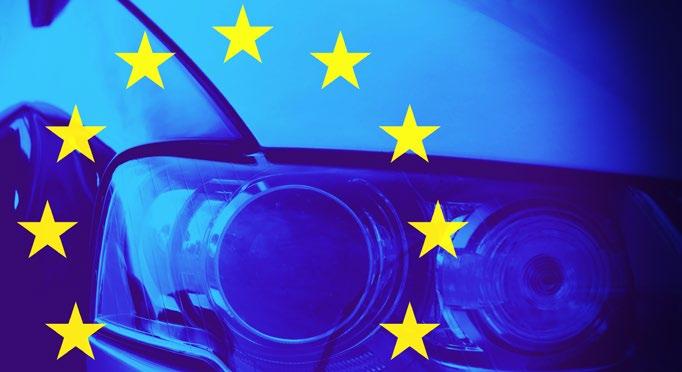

COST OF LIVING CRISIS HAVING
EFFECT ON USED CAR BUYERS
eBay Motors Group found that the ongoing crisis is influencing 75 per cent of buyers’ next car purchases.
Its Consumer Insight Panel quizzed 2,000 new and used car buyers across the UK, and found that of that 75 per cent, 32 per cent said they were putting their purchase on hold.
Meanwhile, 28 per cent said that recent rises in the cost of living will mean they’ll be purchasing a cheaper car, and 16 per cent a smaller one.
However, a quarter of respondents said the increases will have no impact on their next purchase.
The findings identified soaring energy bills as the biggest concern among buyers, with 74 per cent saying these increases will influence their next car purchase.
This was followed by the inflationary impact on goods and services (70 per cent), high petrol and diesel pump prices (68 per cent) and rises in the cost of borrowing (59 per cent) and council tax (57 per cent).
Lucy Tugby, eBay Motors Group marketing director, said: ‘The cost of living crisis is having a profound impact on car buyers, with a third now delaying their purchases.
‘However, the balance is responding to higher
costs by looking to buy cheaper or smaller cars, while a quarter say the rises will have no influence on their buying decisions.
‘Our research shows the resilience of the car market with many buyers saying they will be purchasing out of necessity, despite the impact rising costs are having on their household budgets.’
She added: ‘For dealers this means maximising the online exposure of their stock and pricing to market because now, more than ever, in-market buyers will be looking for value for money.’
CRIMINAL CAR DEALERS TARGET LONDON BUYERS WITH FAKE CHEAP USED CARS

Sophisticated criminals are targeting London used car buyers with adverts for cheap used cars.
The car dealers, purporting to be based in Scotland, are geo targeting social media adverts to London and Home Counties car buyers, knowing it’s unlikely they will travel to check the cars out.
The used cars for sale and the car dealer
don’t actually exist, but the conmen try to convince car buyers to pay for the cars over the phone.
Sandy Burgess, chief executive of the Scottish Motor Trade Association, said: ‘From what I understand, it’s clear these criminals are targeting London because they know it is unlikely for buyers to travel to see the car first.
‘We have hundreds of legitimate car dealers as members here in Scotland, many of whom offer remote sales all over the UK with
tremendous outcomes for the buyers.
‘It is unfortunate that these con men are preying on the general public who are being lured by the cheap prices and then failing to make the basic checks on the dealers concerned which ultimately leads to financial losses.’
The cost of living crisis is beginning to have a ‘profound’ impact on used car buyers, new research has found.Read the full article at
SURVEY REVEALS SHARP RISES IN PUBLIC
CHARGING PRICES
increase of £4.32.
The cost of using a slower public charger (22kW in power or less) has also increased from 34p/kWh to 39p/kWh in the same timeframe – up 14.7 per cent.
However, for drivers who can plug in at home and take advantage of lower electricity rates – according to the Energy Saving Trust, the national average as of October 2022 is 34p/ kWh – this saving increases to £1,200 versus a conventional car.
Data collected by electric car charging mapping service Zap-Map, found that prices have risen by a whopping 14 per cent in recent months, as electricity prices continue to soar.
In September, the average price for a rapid charger with an output higher than 22kW increased to 56p/kWh – a 7p spike when compared to June.
The hike means that it now costs £34.72 to fully charge a typical electric car, such as the MG4 Long Range with its 62kWh battery – an
Using the same MG4 as an example, it will now cost £24.18 for a full charge with one of these units – £3.18 more than in June.
The data highlights just how steeply EVrunning costs have risen in recent times but Zap-Map insists they remain far cheaper than their petrol and diesel counterparts.
On average, electric cars are around £900 cheaper to run than a comparable petrol and diesel car, even when relying purely on public electric car chargers.
A Zap-Map survey of 4,300 electric car drivers found that 41 per cent are now concerned about the high cost of charging – up from 33 per cent in 2021. Despite this, 80 per cent were still confident that an EV is currently cheaper to run than an equivalent petrol or diesel vehicle.
PRODUCTION HURT BY
ISSUES
Of the 63,125 models rolling off factory lines, the number of cars built for the UK market, 14,169 units, was also down, by 0.9%.
Car exports were down by 7.4% to 48,956 units, driven by reductions in shipments to
the EU, US and China, although the number shipped to South Korea, Australia and Turkey increased.
It ended four months of growth in UK car production, SMMT says that output was
again restricted by “severe supply chain issues affecting manufacturers”.
Customers looking to place an order in October will have to wait an average of 35 weeks for their new car; a slight increase of 3.1% (from 34 weeks) since the same time in August.
The shortest waiting times are for MG’s new MG4 and MG5 models, with some dealers offering delivery in just four weeks. However, the company’s ZS EV is still facing waiting lists which are longer than a year.
However, popular models including the Tesla Model Y and the Renault Zoe are enjoying comparatively low waiting times of four to 12 weeks and one to two months respectively.
The cars facing the most dramatic increases
include major volume nameplates from Kia and Vauxhall - the Kia Niro EV now has an average wait of nine months for delivery, up from 4.5 months in August, while both the Vauxhall Corsa-e and Mokka-e waiting times have risen from an average of 3.5 months in August to 10 months in October.
The lead time for orders of new electric vehicles has increased since August, according to new research from Electrifying.com.
A 6% decline in UK car production in September was due to "severe" issues in the supply chain, said the Society of Motor Manufacturers and Traders (SMMT).
The spiralling cost of plugging an EV into a public charger has been revealed in a new study.
ENERGY CRISIS: IMPACT ON COMPETITIVENESS OF EU AUTO SECTOR

IN SUMMARY
Rising energy prices and increased production costs are putting the entire automotive ecosystem under strain.
High inflation rates, unprecedented concerns about energy prices and supply, and lower incomes for Europeans are alarming the whole value chain, from the largest manufacturers to the smallest SMEs, as well as the aftermarket.
The sector appreciates recent policy initiatives at the national and European levels. However, uncertainties about the implementation and effectiveness of these measures persist. A structured dialogue with the sector is therefore urgently needed.
THE NEED FOR STRONG POLITICAL ACTION
The whole automotive value chain – represented by the European Automobile Manufacturers’ Association (ACEA), the European Council for Motor Trades and Repairs (CECRA), the European Association of Automotive Suppliers (CLEPA), European Tech & Industry Employers (CEEMET) and the European Tyre and Rubber Manufacturers’ Association (ETRMA) – is concerned that, without significant political action, it will become increasingly difficult to make the case for manufacturing and investments in the EU.
Additional political initiative is urgently needed to avoid new import dependencies and to ensure access to affordable energy. All energy carriers have a role to play.
We need strong and coordinated EU-wide action that supports both the sector and consumers.
We stand ready to work together with policy makers to ensure the success of the mobility transition.
WHAT ARE THE ISSUES?
y Rising energy prices, coupled with high costs of raw materials and other components, are negatively impacting the automotive sector as well as its customers.
y Costs of production are therefore skyrocketing, undermining profitability and putting investments and the very survival of critical industries within the automotive ecosystem at risk. Industry cannot absorb such high costs in the long-term, especially in the face of competition from other major markets like the US or China.
y As Commissioner Breton pointed out, energy prices in Europe are currently seven to eight times higher than in the US. This clearly undermines the global competitiveness of the EU industry and requires a comprehensive and coordinated policy response. We need a global level playing field.
y Cost increases will have to be passed on along the supply chain and to customers, at a time where high inflation is already limiting the incomes of European households. Affordability of new vehicles is a concern, as it will impact fleet renewal, and ultimately the speed of decarbonisation. Indeed, sales of new vehicles are already down by almost 10% so far this year.
y High costs for industry also jeopardises employment. Industry is doing its utmost to re- and up-skill its employees but cannot do so alone. This also requires active labour market measures from member states.
y Equal conditions must be ensured across the EU. Single market and state aid rules must not undermine fair competition between production sites in different member states. Here, the European Commission has an essential role to play
SUM
SUM
SUM OF CHANGE
ABERDEEN 17388 13088 4300 32.85%
DUMFRIES 5391 4230 1161 27.45%
DUNDEE 9236 6738 2498 37.07%
EDINBURGH 28921 22084 6837 30.96%
FALKIRK 9712 6989 2723 38.96%
GLASGOW 36253 28026 8227 29.35%
HEBRIDES 1172 811 361 44.51%
INVERNESS 10167 7274 2893 39.77%
KILMARNOCK 12049 9475 2574 27.17%
KIRKCALDY 12228 9637 2591 26.89%
KIRKWALL 2025 1409 616 43.72%
LERWICK 872 646 226 34.98%
MOTHERWELL 11431 8703 2728 31.35%
PAISLEY 10977 8204 2773 33.80%
PERTH 6619 4869 1750 35.94%
TWEEDDALE 4192 3298 894 27.11%
TOTAL 178633 135481
MEMBERSHIP ENQUIRIES/ TRADING PARTNERS:
Norman Stirling – 07917 095014
Membership Development Manager

Marcus Lawrence – 07375 057561
Territory Account Manager, Western Region Stuart Kennedy – 07375 057560
Territory Account Manager, Northern Region
MOT QMS ENQUIRIES

David Innes – 07789 264228

Operations Manager, Support Services Colin Meldrum – 07917 042576

Support Services Consultant

Gordon Laing – 07799 732124 Support Services Consultant
APPRENTICE TRAINING ENQUIRIES
Fraser Miller – 07789 264229
Apprentice Training Manager Kevin Millar – 07593 800386 Kickstart Gateway Project Manager
EMPLOYMENT LAW ENQUIRIES
Moira Gaynor – 0141 331 5150 Company Secretary/Finance Manager
SCOTSURE WARRANTY:
Lynn Greig – 07597 581335
Scotsure Account Manager, Scotland Claims and Enquiries – 0131 331 5512
EVENTS & MEDIA ENQUIRIES:
Karen Thompson – 07922 079889 Events & Media Manager
ADVERTISING/SPONSORSHIP ENQUIRIES:
Wendy Hennessy – 07974 380140
Scottish Motor Trade Association Ltd., Palmerston House, 10 The Loan, South Queensferry EH30 9NS
SMTA Ltd Tel: 0131 331 5510 www.smta.co.uk
